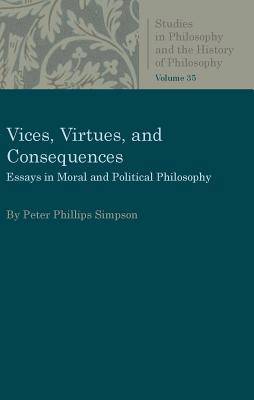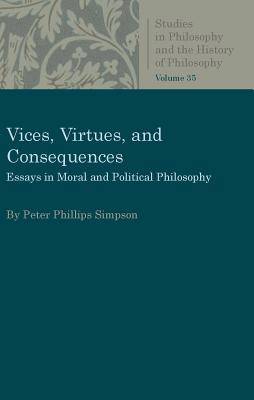
Je cadeautjes zeker op tijd in huis hebben voor de feestdagen? Kom langs in onze winkels en vind het perfecte geschenk!
- Afhalen na 1 uur in een winkel met voorraad
- Gratis thuislevering in België vanaf € 30
- Ruim aanbod met 7 miljoen producten
Je cadeautjes zeker op tijd in huis hebben voor de feestdagen? Kom langs in onze winkels en vind het perfecte geschenk!
- Afhalen na 1 uur in een winkel met voorraad
- Gratis thuislevering in België vanaf € 30
- Ruim aanbod met 7 miljoen producten
Zoeken
€ 56,45
+ 112 punten
Omschrijving
Vices, Virtues, and Consequences offers a broad study of the basic and universal issues in ethics and politics, the issues of what the human good is and how to attain it and avoid its opposite. These questions have long been debated and are no less debated today. However, according to author Peter Phillips Simpson, within the mainstream of Anglo-American modern philosophy they have been debated too narrowly. This narrowness is one of our modern vices, and it does much to encourage other vices, in particular that of despair of universal and objective reason. The essays in this collection not only attack these vices, but also attempt to replace them with the contrary virtues. The volume begins with an overview of modern Anglo-American moral philosophy and critiques the work of contemporary thinkers--specifically Alasdair MacIntyre and John Rawls--and the work of historical thinkers such as Machiavelli, Kant, and Hobbes. The author then explores ancient and medieval sources, and applies their concepts to discussions of modern problems. The book closes with chapters that discuss the direct consequences of contemporary vices in both thought and action, in particular the vice of failing to educate the morals of citizens. Simpson rejects the contemporary liberal dogma that political authority should not be involved in the moral education of citizens. Violence in Northern Ireland and the crime of abortion are among the issues discussed. Peter Phillips Simpson is professor of philosophy and classics at the Graduate Center and the College of Staten Island, City University of New York. He is the author of numerous articles and books including The Politics of Aristotle, A Philosophical Commentary on the Politics of Aristotle, and Karol Wojtyla. "An important and significant contribution to the field. Simpson presents classical sources with a freshness and thoroughness not often seen."--Prof. John Hittinger, U.S. Air Force Academy "Simpson's application of his view to the current crisis in liberal culture is clear, consistent, and timely."--Prof. Nicholas Capaldi, University of Tulsa "It is a rare pleasure to read a book that combines the elegance and rigour of the best of analytic philosophy with the imaginative breadth and radical seriousness of some of its rivals." -- Margaret Atkins, Heythrop Journal
Specificaties
Betrokkenen
- Auteur(s):
- Uitgeverij:
Inhoud
- Aantal bladzijden:
- 283
- Taal:
- Engels
- Reeks:
Eigenschappen
- Productcode (EAN):
- 9780813232003
- Verschijningsdatum:
- 17/01/2019
- Uitvoering:
- Paperback
- Formaat:
- Trade paperback (VS)
- Afmetingen:
- 150 mm x 226 mm
- Gewicht:
- 498 g

Alleen bij Standaard Boekhandel
+ 112 punten op je klantenkaart van Standaard Boekhandel
Beoordelingen
We publiceren alleen reviews die voldoen aan de voorwaarden voor reviews. Bekijk onze voorwaarden voor reviews.









